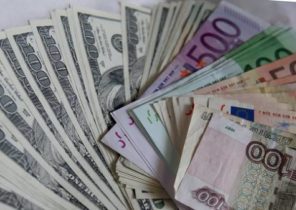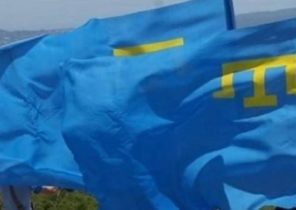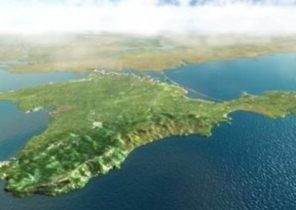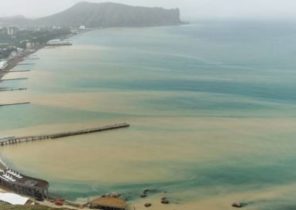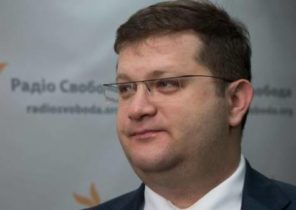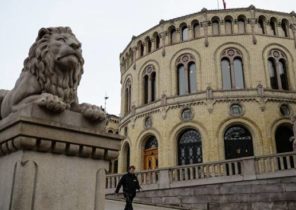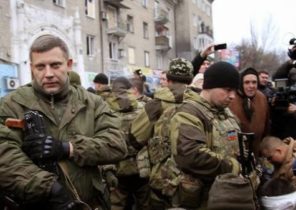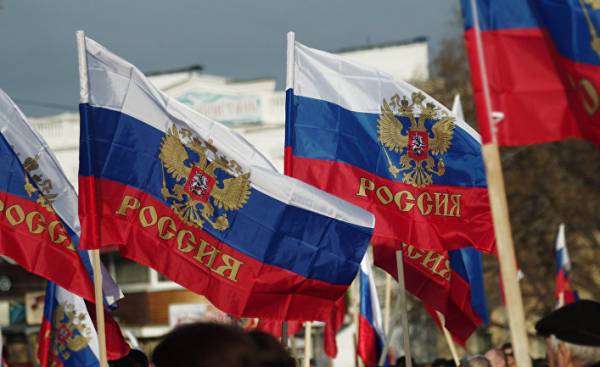
In the three years since the annexation of Crimea, in Russia there is a consensus that everything connected with the Ukrainian Peninsula was an internal affair of Russia, and is not the most important.
“Annexation of the Crimea” quite successfully occurred even in the minds of opponents of the regime. In November 2016, Mikhail Khodorkovsky, in a dispute with Crimean Tatar journalist Ayder by Murzabaeva articulated the position that was then supported by many public figures liberal and activists, and intellectuals: the Russian society wants to deal with other issues, for the opposition, the main task — change of power, and the return of the Crimea under jurisdiction of Ukraine in a democratic way is impossible, because public opinion is against it. In the presidential program of Alexei Navalny on Crimea, not saying a word.
The Russian media, which is considered to be liberal (the word “opposition” these media usually do not like), is also without special problems has taken the annexation and most of the associated rhetoric. And the TV channel “Rain”, RBC (including, to change the wording), and working from Latvia and beyond the control of the Russian justice online resource “Medusa” has long been a routine call and depict Crimea as part of Russia. The usual explanation that it is required by Russian law, and that disobedience is fraught with penalties sounds like an evasion: the law does not require the inclusion of the Crimea to test the knowledge of cities of Russia (was changed after public criticism) or calling the annexation a “reunion” (the text was also changed).
The Russian journalists usually don’t see any problem to defiantly violate the laws of Ukraine (which allows entry to the occupied territory through the checkpoint in Perekop) and fly to the Crimea aircraft from Russia (did that even an employee of Deutsche Welle Yuri Sieve) because it is cheaper, faster and easier, and Ukrainian the rules cumbersome, inconvenient and non-binding.
After that you can write as many critical reports about human rights violations in the Crimea — it doesn’t change the main point: voluntary compliance with inconvenient rules of the Ukrainian equivalent to the symbolic recognition of the sovereignty of Ukraine over Crimea, and in Russia, few people want to admit.
Meanwhile, the capture of the Crimea was the cause of many current problems in Russia, the overcoming of which is on the agenda of the Russian opposition, and revealed peculiarities of Russian society that existed long before the attack on Ukraine.
The seizure of Crimea was the cause of many current problems in Russia and revealed peculiarities of Russian society that existed long before the attack on the Ukraine
For example, it became clear not only the extent of the Imperial sentiment, but the actual place of the Crimea in the understanding of the Russians themselves as a society and nation. Imperial myth, which still lives in Russia, was created during the reign of Catherine the Second. Peter’s reforms since their conduct cause a mixed reaction: after all, they are “cringing”, and to be in Holland so much. Catherine, with a great European power with roots Dating back to antiquity, the direct heir of Byzantium, the Third Rome, Europe more than Europe itself. Her Grand “southern project,” which involved the defeat of Turkey, the Union of all the Orthodox countries into one Empire and hoisting grandson, Grand Duke Constantine Pavlovich on the throne of Constantinople, crashed about the political reality of all the great fantasies came true only the seizure of the Crimean khanate in 1783.
This capture was for Russia very atypical — not subjugation and subordination problematic neighbor, but a complete rethinking, rewriting annexed territory. The rewriting was accompanied by the first mass expulsion of Crimean Tatars — they did not fit into the picture of a bright past that for a living doodling on the attached territory Grigory Potemkin and resettlement of the Crimea Orthodox descendants of Plato and Aristotle: the Pontic Greeks, the “great Russians” and “Russians.” All of these details, naturally, long forgotten — not forgotten the Central place of the Crimea in the consciousness of the “great European nation,” which is manifested, in particular, in the infinitely repeated absurd formula “Crimea has always been Russian”.
This formula perfectly illustrates the peculiarities of the historical memory in Russia. Today’s “Russianness” of Crimea — the result of two hundred years of continuous genocide and displacement of “non-Russian population”, the culmination of which came during the Second World war: After two Soviet deportations of 1941 and 1944 (the Germans were deported, Greeks, Bulgarians, Italians, Armenians, Karaites, Crimean Tatars), the losses in the fighting and extermination by the Nazis of Jews and Krymchaks in Crimea remained about one-third of the prewar inhabitants and was settled by immigrants from Russia and Ukraine, among whom were particularly well represented military and veterans of the party and the security services.
Of course, today, few people in Russia sees Crimea as conquered and destroyed to the ground a country where until relatively recently there was a full-fledged state, long preserved a distinctive way of life, and the Russians were not the ethnic majority, even in the life of the current older generation.
The tradition to perceive the Crimea as a territory, not as a society, and people treated as a pesky inconvenience to be retained with Catherine’s time to this day. The formal pretext for the Russian invasion was the “protection of Russian-speaking population of Crimea”, but “krymnashe” attitude of Russians to the people of the Peninsula from the outset was quite skeptical: they say, the main occupation of the Crimean — parasite on tourists, and in Russia they are attracted by the exceptionally high wages.
Moreover, this view is prevalent across the political spectrum. His very characteristic way formulated liberal journalist and public figure Sergei Parkhomenko: “… when the first five days in a row to explain to the population of Crimea that in the event of a return under the jurisdiction of Ukraine will increase salaries and pensions and be allowed to build more coops for rent in foreshore, and then asking them to vote in the referendum, will be 95 percent of the way back. […] These people have proven that they do not care whom to belong. And that’s really who I am now and really don’t feel for a second, reading how they are fooled, robbed, milked them and put the thugs in the heads and owners — it’s just that the Crimean population.”
Massive support by the Russians for the annexation has much more serious and immediate consequences than a demonstration of a deeply rooted chauvinism
Massive support by the Russians for the annexation has much more serious and immediate consequences than a demonstration of a deeply rooted chauvinism. Endorsing “krymnash”, the Russians recognized its power standing above the law and sanctioned the violation of any of her laws and treaties for the sake of some higher interests or “equity”. The Russian government did before, but now she has received from companies with a relevant mandate. It is quite natural that following the capture of the Crimea tightening is accompanied by spectacular acts of tyranny.
One such acts was the demolition of the retail pavilions in Moscow — despite the title of ownership and the decisions of the courts. There is nothing accidental in the fact that the Moscow authorities justified their actions precisely by reference to the law adopted for the solution of problems with real estate in the Crimea. A 20-year term Oleg Sentsov has set a new bar for convictions in political Affairs: to the Crimea “dvushechku” was given for participation in active forms of protest, then began to give over shares of “Vkontakte” and the pickets.
In fact, any government that will put the task of construction in Russia a legal state, you will need to first cancel the “mandate for tyranny.” The attitude of the Russian opposition to Crimea shows that the rule of law do not fall within its priorities. Recorded on Putin’s personality, it does not consider the turnover of power as a derivative of the rule of law. What it does not offer any realistic scenario of change of power by itself is not the problem: the current government structure of Russia a peaceful change of power does not imply. Change in the system may occur, as in the USSR, on the initiative of the elite and under the influence of external circumstances: the state of the economy, public attitudes, foreign policy factors.
A much more serious problem of the opposition is that it has no substantial project that will be then.
If we assume that the alternative to Putin, Navalny, Khodorkovsky or someone else, and democratic state of law, the path to it block the two obstacles: the Crimea and Chechnya. No vision of how to establish control over Chechnya and to include it in a common legal space in Russia, there is no opposition — but it is at least possible in theory. With Crimea this is not possible — on the international recognition part of Russia hope not, and if we continue to consider the Crimea part of Russia, then he will remain a legal anomaly. Moreover, no rule of law even formally impossible without respect for international law.
In discussing the problem of the Crimea, the Russian opposition demonstrates an understanding of democracy, which is not very different from Putin (but in tune with the rhetoric of Donald trump and the European populists): what is the power based on the support of the majority and not burdened by compliance with the laws, procedures and international obligations. Mikhail Khodorkovsky, for example, believes “the democratic process”, not the restoration of the rule of law, and the adoption of any decision on Crimea based on the opinion of the majority, which is presumably against his return to Ukraine. Alexei Navalny proposed a new, “normal” referendum.
What most people think, is there any issue of public opinion and how to count it, neither Khodorkovsky nor Bulk, nor for many other members of the opposition obviously do not matter. By the same logic, since Putin supports the majority of the Russian population, no opposition it is impossible to in principle. All these contradictions can be resolved, only implicitly recognizing as the illegal annexation of Crimea, and the absolute impossibility of its holding in Russia on any grounds.
With Crimea, Russia has no positive alternative to the current regime. And while Russian opposition is concerned exclusively with the change of government, and refuses to discuss the problem of Crimea, the only thing she can offer is Putin’s Russia without Putin. But whoever was in his place, changes will not be too visible.
